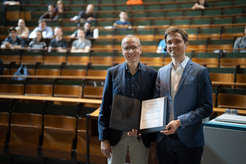Joannis Koepsell wins the Theodor Hänsch PhD Award 2022
Joannis Koepsell receives the prize for his outstanding dissertation entitled “Quantum simulation of doped two-dimensional Mott insulators”.
The Theodor Hänsch PhD Award honours outstanding dissertations in the field of physics. The award is named after Theodor Hänsch, 2005 Nobel Prize winner in Physics and Chair of Experimental Physics at the LMU Faculty of Physics, Director at the Max Planck Institute of Quantum Optics and MCQST member. The prize is sponsored by the Wilhelm and Else Heraeus Foundation, a private institution that supports scientific research and education with an emphasis on physics. The award is donated to the Faculty of Physics and is endowed with 4,000 euros.

The accolade, presented by Professor Immanuel Bloch on 8 May 2023, marks a major milestone in Joannis Koepsell’s professional journey, recognising his outstanding contributions to the field.
“This work used ultracold-atom-based quantum simulation to explore exotic phenomena of strongly-correlated electronic materials. We developed a bilayer-readout technique to realise spin- and density-resolved microscopy of individual fermionic atoms. This enabled a direct real-space observation of magnetic polarons and their dressing cloud”, explains the award winner.
Joannis was first author of the paper describing the first-ever successful photographing of the magnetic structure around a mobile charge carrier within a crystal lattice, so-called magnetic polarons, using a quantum simulator. The work was featured on the cover of Nature on 15 August 2019.
“I am truly honoured to receive this prize. It recalls the deep gratitude I feel for the excellent time I experienced at the institute during my PhD.”
Joannis did his PhD at the Max Planck Institute of Quantum Optics in the Quantum Many-Body Systems Group of Professor Immanuel Bloch. He received his doctorate degree from the LMU München in 2021. After finishing his PhD, Joannis joined the R&D department of ZEISS SMT GmbH. As a project manager, he leads the development of photomask repair solutions, which are required for the manufacturing of high-end computer and mobile phone chips.
Congratulations, Joannis!
Adapted from MCQST (original source)












